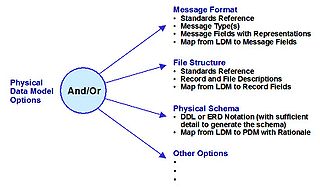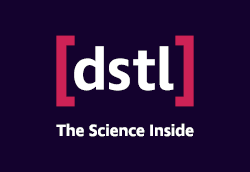Related Research Articles

Extensible Markup Language (XML) is a markup language and file format for storing, transmitting, and reconstructing arbitrary data. It defines a set of rules for encoding documents in a format that is both human-readable and machine-readable. The World Wide Web Consortium's XML 1.0 Specification of 1998 and several other related specifications—all of them free open standards—define XML.

The Cabinet Office is a department of the UK Government responsible for supporting the prime minister and Cabinet. It is composed of various units that support Cabinet committees and coordinate the delivery of government objectives via other departments. As of December 2021, it had over 10,200 staff, mostly civil servants, some of whom work in Whitehall. Staff working in the Prime Minister's Office are part of the Cabinet Office.

A physical data model is a representation of a data design as implemented, or intended to be implemented, in a database management system. In the lifecycle of a project it typically derives from a logical data model, though it may be reverse-engineered from a given database implementation. A complete physical data model will include all the database artifacts required to create relationships between tables or to achieve performance goals, such as indexes, constraint definitions, linking tables, partitioned tables or clusters. Analysts can usually use a physical data model to calculate storage estimates; it may include specific storage allocation details for a given database system.

XBRL is a freely available and global framework for exchanging business information. XBRL allows the expression of semantic meaning commonly required in business reporting. The standard was originally based on XML, but now additionally supports reports in JSON and CSV formats, as well as the original XML-based syntax. XBRL is also increasingly used in its Inline XBRL variant, which embeds XBRL tags into an HTML document. One common use of XBRL is the exchange of financial information, such as in a company's annual financial report. The XBRL standard is developed and published by XBRL International, Inc. (XII).
THOMAS was the first online database of United States Congress legislative information. A project of the Library of Congress, it was launched in January 1995 at the inception of the 104th Congress and retired on July 5, 2016; it has been superseded by Congress.gov.
The National Insurance number is a number used in the United Kingdom in the administration of the National Insurance or social security system. It is also used for some purposes in the UK tax system.
NIEMOpen, frequently referred to as NIEM, originated as an XML-based information exchange framework from the United States, but has transitioned to an OASISOpen Project. This initiative formalizes NIEM's designation as an official standard in national and international policy and procurement. NIEMOpen's Project Governing Board recently approved the first standard under this new project; the Conformance Targets Attribute Specification (CTAS) Version 3.0. A full collection of NIEMOpen standards are anticipated by end of year 2024.
The e-Government Metadata Standard, e-GMS, is the UK e-Government Metadata Standard. It defines how UK public sector bodies should label content such as web pages and documents to make such information more easily managed, found and shared.

The Defence Science and Technology Laboratory (Dstl) is an executive agency of the Ministry of Defence of the United Kingdom. Its stated purpose is "to maximise the impact of science and technology for the defence and security of the UK". The agency is headed by Paul Hollinshead as its Chief Executive, with the board being chaired by Adrian Belton. Ministerial responsibility lies with the Minister for Defence Procurement.
International standards in the ISO/IEC 19770 family of standards for IT asset management address both the processes and technology for managing software assets and related IT assets. Broadly speaking, the standard family belongs to the set of Software Asset Management standards and is integrated with other Management System Standards.
Election Markup Language (EML) is an XML-based standard to support end to end management of election processes.

Ramachandran Balasubramanian is an Indian mathematician and was Director of the Institute of Mathematical Sciences in Chennai, India. He is known for his work in number theory, which includes settling the final g(4) case of Waring's problem in 1986.

Vivek Kundra is a former American administrator who served as the first chief information officer of the United States from March, 2009 to August, 2011 under President Barack Obama. He is currently the chief operating officer at Sprinklr, a provider of enterprise customer experience management software based in NYC. He was previously a visiting Fellow at Harvard University.

The Government Office for Science is a science advisory office in the UK Government. The office advises the Government on policy and decision-making based on science and long-term thinking. It has been led by Professor Dame Angela McLean, the Government Chief Scientific Adviser, since 23 February 2023.
A metadata standard is a requirement which is intended to establish a common understanding of the meaning or semantics of the data, to ensure correct and proper use and interpretation of the data by its owners and users. To achieve this common understanding, a number of characteristics, or attributes of the data have to be defined, also known as metadata.

Data.gov is a U.S. Government website launched in late May 2009 by the Federal Chief Information Officer (CIO) of the United States, Vivek Kundra. Data.gov aims to improve public access to high value, machine-readable datasets generated by the Executive Branch of the Federal Government. The site is a repository for Federal, state, local, and tribal government information made available to the public.
MTConnect is a manufacturing technical standard to retrieve process information from numerically controlled machine tools. As explained by a member of the team that developed it, "This standard specifies the open-source, royalty-free communications protocol based on XML and HTTP Internet technology for real-time data sharing between shopfloor equipment such as machine tools and computer systems. MTConnect provides a common vocabulary with standardized definitions for the meaning of data that machine tools generate, making the data interpretable by software applications." A simple, real-world example of how this tool is used to improve shop management is given by the same author.
Microdata is a WHATWG HTML specification used to nest metadata within existing content on web pages. Search engines, web crawlers, and browsers can extract and process Microdata from a web page and use it to provide a richer browsing experience for users. Search engines benefit greatly from direct access to this structured data because it allows them to understand the information on web pages and provide more relevant results to users. Microdata uses a supporting vocabulary to describe an item and name-value pairs to assign values to its properties. Microdata is an attempt to provide a simpler way of annotating HTML elements with machine-readable tags than the similar approaches of using RDFa and microformats.
SinglePoint is a piece of address management software from Aligned Assets. Its primary function is to act as a search engine that allows the user to search a central address database by entering search terms.
The United Kingdom Space Agency (UKSA) is an executive agency of the Government of the United Kingdom, responsible for the United Kingdom's civil space programme. It was established on 1 April 2010 to replace the British National Space Centre (BNSC) and took over responsibility for government policy and key budgets for space exploration; it represents the United Kingdom in all negotiations on space matters. The Agency "[brings] together all UK civil space activities under one single management". It is based at the former BNSC headquarters in Swindon, Wiltshire.